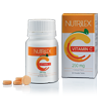Who needs CALCIUM supplement the most?
Calcium supplements are necessary for certain individuals due to various factors that may lead to an insufficient intake of this essential mineral through regular diet alone. The followings are the specific groups of people who need calcium supplements the most:

1. Postmenopausal Women:
Postmenopausal women are at an increased risk of osteoporosis, a condition characterised by weakened bones. Estrogen levels decline after menopause, leading to decreased bone density. Calcium supplements can help mitigate bone loss and reduce the risk of fractures.

2. Elderly Individuals:
Aging is associated with a decline in bone density, making older individuals more susceptible to fractures and osteoporosis. Calcium supplements, along with vitamin D, are often recommended to support bone health in the elderly and prevent age-related bone loss.

3. Children and Adolescents:
During periods of rapid growth, such as childhood and adolescence, the body's demand for calcium is high. Insufficient calcium intake during these critical stages can hinder optimal bone development. Calcium supplements can be beneficial for individuals with inadequate dietary calcium or those with specific medical conditions affecting absorption.

4. Pregnant and Breastfeeding Women:
Pregnancy and lactation place increased demands on a woman's calcium stores. Calcium is essential for the development of the baby's bones and teeth. If dietary calcium intake is insufficient, supplements may be recommended to ensure both maternal and fetal health.

5. Individuals with Lactose Intolerance:
Lactose intolerance can lead to a reduced intake of dairy products, a primary source of dietary calcium. Individuals with lactose intolerance may benefit from calcium supplements to maintain adequate levels of this mineral for bone health.

6. People with Certain Medical Conditions:
Individuals with medical conditions that affect calcium absorption, such as inflammatory bowel disease (IBD), celiac disease, or certain gastrointestinal surgeries, may require calcium supplements. These conditions can impair the body's ability to absorb calcium from food.

7. Those on Vegan or Restricted Diets:
Individuals following vegan or other restrictive diets that exclude dairy products may find it challenging to obtain sufficient calcium from plant-based sources alone. Calcium supplements can be essential to meet daily requirements and prevent deficiencies.
Note: However, additional calcium is not suitable for everyone, such as those who have hypercalcemia. It is best to consult a doctor prior to adding calcium supplements to diet.

Although calcium is widely available in various foods, today’s lifestyle and eating habits often fall short in meeting the recommended daily calcium intake. For instance, processed and fast foods is often low in calcium. For those who suffer from lactose intolerance or those who have dietary preferences (such as veganism) also have higher tendency of calcium deficiency. Sedentary indoor activities and increased use of sunscreen, may limit sunlight exposure, leading to insufficient vitamin D production, hence impact on body’s ability to abosord calcium. The trending coffee culture may also affect the calcium level in your body because caffeine increases urinary calcium excretion that may lead to calcium loss from bones.

In summary, calcium supplements provide a good solution for specific populations with increased nutritional needs or challenges in obtaining adequate calcium through their regular diet. Recognizing the importance of comprehensive bone health, we are excited to introduce our new product – NUTRiLEX CALCIUM PLUS. It is a calcium Supplement meticulously formulated with not only calcium but also essential synergistic vitamins, D3 and K2. This innovative supplement aims to enhance calcium absorption, promote optimal bone mineralisation and contribute to overall well-being.
 Malaysia
Malaysia Thailand
Thailand































